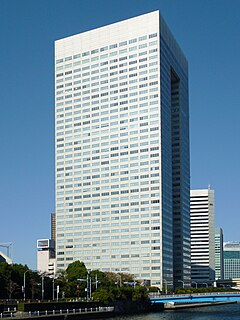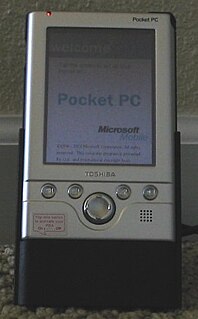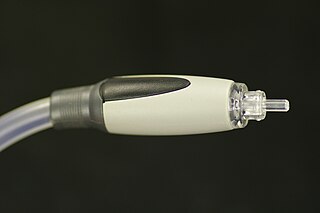 W
WToshiba Corporation is a Japanese multinational conglomerate headquartered in Minato, Tokyo. Its diversified products and services include power, industrial and social infrastructure systems, elevators and escalators, electronic components, semiconductors, hard disk drives, printers, batteries, lighting, as well as IT solutions such as quantum cryptography. It was one of the biggest manufacturers of personal computers, consumer electronics, home appliances, and medical equipment. As a semiconductor company and the inventor of flash memory, Toshiba had been one of the top 10 in the chip industry until its flash memory unit was spun off as Toshiba Memory, later Kioxia, in the late 2010s.
 W
WThe Libretto is a line of subnotebook computers that was designed and produced by Toshiba. The line was distinguished by its combination of functionality and small size, squeezing a full Windows PC into a device the size of a paperback book. The first Libretto model, the Libretto 20, was released on April 17, 1996, with a volume of 821 cm3 (50.1 cu in) and weighing just 840 g (30 oz), making it by far, the world's smallest commercially available Windows PC at the time, and a trend the Libretto Range continued for many years. The original Libretto line was discontinued in Europe and the U.S. in 1999, but the production continued in Japan with the SS, FF and then the L series until 2002. The first L series Libretto was released on 18 May 2001 and the last just 11 Months later on 24 April 2002. Production of all Librettos ceased from 2002 until the release of the Libretto U100 in 2005.
 W
WToshiba Portégé is a range of business-oriented ultra-light laptops manufactured by Toshiba, where Portégé is the prefix name for each of the models in a current series.
 W
WThe Qosmio series was Toshiba's consumer-marketed line of high performance desktop replacement laptops. The laptop was first released on July 25, 2004 as the E15-AV101 with a 1.7 GHz Intel Pentium M CPU, 512 megabytes of DDR SDRAM, and a 15-inch XGA 1,024 by 768 screen. Toshiba's most powerful laptop has undergone many revisions, with focus shifting from high-end multimedia functionality to heavy gaming. The current line, the X70 series, was released in 2013, featuring an Intel Core i7 processor with up to 32 gigabytes of DDR3 SDRAM and an nVidia Geforce GTX 770M as well as a 17.3 inch Full HD display.
 W
WThe Toshiba Satellite was a line of consumer-grade notebook computers marketed by Toshiba, and were some of the earliest laptops, introduced in the early-1990s, to compete with the IBM ThinkPad line. Models in the Satellite family varied greatly - from entry-level models sold at major retailers to full-fledged media center-class notebooks. The latter are labeled as "Qosmio" and sold alongside the Satellite name. The Qosmio models tended to have added features like two hard drive bays, multiple graphics cards, several input/output ports of varying design, unique case styling, backlit keyboards, significantly more powerful sound systems, etc. The Satellite mainly competes against computers such as Acer's Aspire, Dell's Inspiron and XPS, HP's Pavilion, Stream and Envy, Lenovo's IdeaPad and Samsung's Sens.
 W
WSmartMedia is a flash memory card standard owned by Toshiba, with capacities ranging from 2 MB to 128 MB. The format mostly saw application in the early 2000s in digital cameras and audio production. SmartMedia memory cards are no longer manufactured.
 W
WThe Toshiba T1000 was a laptop computer manufactured by the Toshiba Corporation in 1987. It had a similar specification to the IBM PC Convertible, with a 4.77 MHz 80C88 processor, 512 kB of RAM, and a monochrome CGA-compatible LCD. Unlike the Convertible, it includes a standard serial port and parallel port, connectors for an external monitor, and a real-time clock.
 W
WThe Toshiba T1100 is a laptop manufactured by Toshiba in 1985, and has subsequently been described by Toshiba as "the world's first mass-market laptop computer". Its technical specifications were comparable to the original IBM PC desktop, using floppy disks, a 4.77 MHz Intel 80C88 CPU, 256 kB of conventional RAM extendable to 512 kB, and a monochrome LCD capable of displaying 80x25 text and 640x200 CGA graphics. Its original price was 1899 USD.
 W
WThe Toshiba T1200 was a laptop manufactured by the Toshiba Corporation, first made in 1987. It was an upgraded version of the Toshiba T1100 Plus.
 W
WT3100 was a portable PC manufactured by Toshiba and released in 1986. It featured a 10 MB hard drive, 8 MHz Intel 80286 CPU and a black & orange 9.6" gas-plasma display with a resolution of 640x400 pixels.
 W
WThe Tecra is a series of business laptops currently manufactured by Sharp Corporation. The number of Tecra notebook models available for sale is strictly dependent on the location: North and South America, Europe, Africa and South Africa, the Middle East or the South Pacific region.
 W
WThe Toshiba e310 was a personal digital assistant manufactured by Toshiba and first released in 2002. It ran Windows Pocket PC 2000 and featured a color 240x320 pixel touch-screen LCD, a 206MHz CPU, and 32MB of RAM. It was also equipped with a Secure Digital card slot, allowing for the expansion of internal memory and a Lithium-ion battery. A software upgrade was issued by Toshiba in 2003.
 W
WTOSLINK is a standardized optical fiber connector system. Also known generically as optical audio, its most common use is in consumer audio equipment, where it carries a digital audio stream from components such as CD and DVD players, DAT recorders, computers, and modern video game consoles, to an AV receiver that can decode two channels of uncompressed lossless PCM audio or compressed 5.1/7.1 surround sound such as Dolby Digital or DTS Surround System. Unlike HDMI, TOSLINK does not have the bandwidth to carry the lossless versions of Dolby TrueHD, DTS-HD Master Audio, or more than two channels of PCM audio.